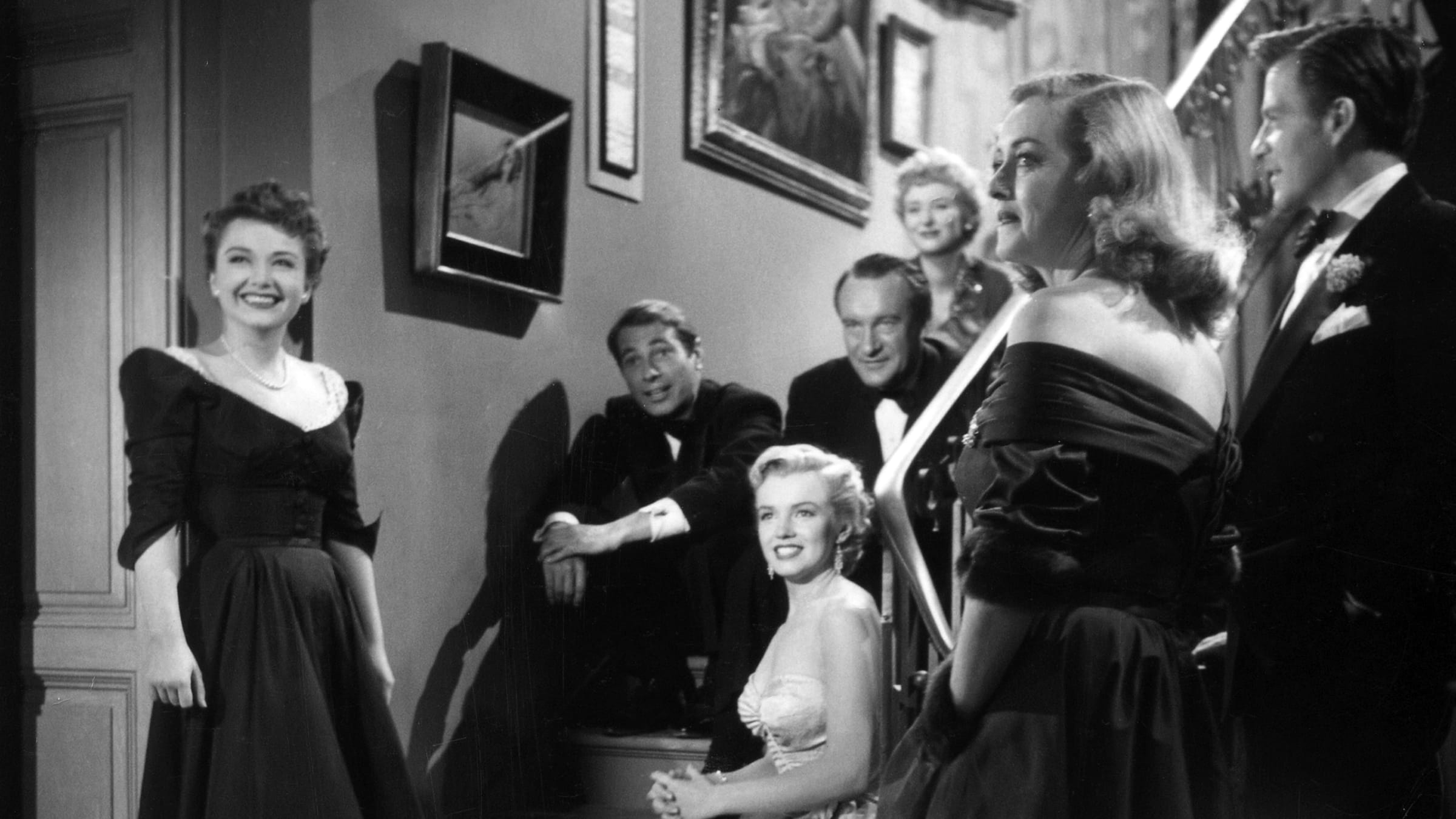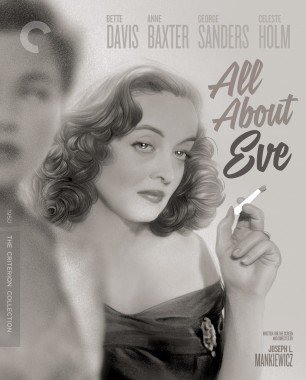All About Eve: Upstage, Downstage

Bette Davis gets the first laugh in Joseph L. Mankiewicz’s All About Eve (1950), and a little over two hours later, she gets the last laugh too. The film opens at the dinner for something called the Sarah Siddons Award for Distinguished Achievement in the Theatre, which is bestowed on a Broadway performer annually. Davis’s character, a forty-year-old star named Margo Channing, is not the recipient. While the critic Addison DeWitt (George Sanders) narrates in voice-over and an elderly thespian drones on from the dais, the camera finds Margo at her table, where, in medium close-up, she selects a cigarette from a case, taps it three times, lights it, inhales, exhales, pours herself a drink, deftly but firmly blocks an unseen companion’s attempt to add water to her libation, then lifts her heavy-lidded gaze to the goings-on at the podium, looking, somehow, both venomous and bored to the depths of her soul. None of her little bits of business is exaggerated or obviously “comic,” but in combination they’re explosively funny. Mankiewicz constructs the scene to highlight the contrast between the acrid cynicism of Addison’s commentary and the treacly speechifying of both the doddering emcee and the dewy-eyed honoree, a young woman who calls herself Eve Harrington (Anne Baxter). Davis’s brief, hilarious pantomime leaves Mankiewicz’s beautifully crafted verbal ironies in the dust.
And although Mankiewicz, who wrote as well as directed, was known as a man who prized words above all else, he lets his star upstage his script. He was no fool, and Davis, who’d spent much of her career laboring to bring a breath of life to deadly dialogue, was duly appreciative. In her 1962 autobiography, The Lonely Life, she wrote: “It was a great script, had a great director, and was a cast of professionals all with parts they liked. It was a charmed production from the word go.” She was not promiscuous with that sort of praise, especially for writers and directors. Then she went further: “After the picture was released, I told Joe he had ‘resurrected me from the dead.’” She even tried to persuade him to write a sequel for her. Davis hadn’t been the first choice for the part. The producer, Darryl F. Zanuck, wanted Marlene Dietrich; Mankiewicz preferred Claudette Colbert, and got his way. But Colbert threw her back out not long before the start of shooting, and Zanuck and Mankiewicz had to scramble to replace her. They considered the stage actor Gertrude Lawrence, who, they discovered to their horror, objected to the character’s vigorous smoking and drinking in the party scene that is the movie’s centerpiece, and thought that instead she might sit at the piano and sing a song. So they turned to Davis, although she wouldn’t be available until days before filming began—she was finishing up her chores on a stinker called Payment on Demand—and although more than one of the director’s colleagues did their best to warn him off. According to Mankiewicz, Edmund Goulding, who had directed Davis in four pictures, was particularly vehement: “Have you gone mad? This woman will destroy you, she will grind you down to a fine powder and blow you away.”
As we know, Goulding’s dire prediction did not come to pass. The shooting, which began in April 1950 at the Curran Theatre in San Francisco, went smoothly, with Davis smoking and drinking enthusiastically (in character) and singing no songs, while Mankiewicz, unpulverized, puffed his pipe contentedly on the sidelines. “Eve was the only picture,” Davis once said, “where everybody working on it was in seventh heaven and it all came out right.” The screenplay was adapted from a short story by Mary Orr, “The Wisdom of Eve,” which was published in Cosmopolitan in 1946 and tells the simple tale of an older actor betrayed by her young protegée. Orr said the story was based on something that happened to the Austrian-British actor Elisabeth Bergner (now known to American audiences, if at all, for her lovely performance as Rosalind in Paul Czinner’s 1936 film of As You Like It, opposite Laurence Olivier). Mankiewicz, a student of theater history, liked to claim that he’d based his Margo Channing on Peg Woffington, an Irish-born leading lady of the eighteenth-century stage, famous in London both for her acting and for her long relationship with the most celebrated actor of the day, David Garrick. The suspicion at the time of the picture’s release was that the actual model for Margo was Davis’s flamboyant contemporary Tallulah Bankhead, a theory that Davis and Mankiewicz denied. (According to the director, Davis showed up for the first day of filming with a throat ailment that deepened her voice to a Tallulah-esque growl that she then had to retain for the rest of the shoot.)

“There are performers who are addicted to emotion, as if to a drug, and Margo is clearly one of them.”

“By the time Mankiewicz made All About Eve, he knew how to assemble a cast that could bring his showy scenes off.”




